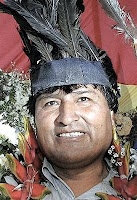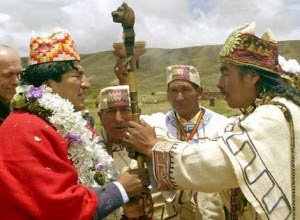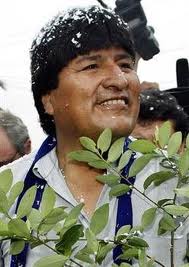As we have discussed, the International Narcotics Control Board — a United Nations monitoring body that oversees the implementation of the UN drug control conventions — has called for the governments of Bolivia and Peru to abolish all uses of the coca leaf, including coca leaf chewing. In its 2007 annual report, the INCB asked Bolivia and Peru to make possessing and using coca leaf criminal offenses — a move that would make criminals of millions of people in the Andes and Amazon.
The Peruvian response was dramatic, with legislators defiantly chewing coca leaves on the congressional floor. The current meeting of the United Nations Commission on Narcotic Drugs in Vienna has elicited a strong response from Bolivia as well. Some context might be helpful.
 |
| Morales wearing indigenous clothes |
Although publicly declaring himself a Catholic, Morales has actively promoted indigenous beliefs, including appointing traditional shamans to his government. Bolivia’s previous constitution had allowed for freedom of religion, but had specified Roman Catholicism as the sole state religion. The new Bolivian constitution, approved in January, has the stated goal of refounding Bolivia as a “socially just state guided by indigenous beliefs,” including the elevation of Pachamama, Earth Mother, to the same stature as the God of Christianity.
In a recent dissertation in social anthropology at the University of Gothenburg, Sweden, entitled As Though We Had No Spirit: Ritual, Politics and Existence in the Aymara Quest for Decolonization, Anders Burman examines how the government policy of decolonization has been interwoven with indigenous rituals and cosmology. He carried out his ethnographic field work among shamans and activists within the Andean indigenous people’s movement.
 |
| Morales receives a sacred staff from an indigenous shaman |
Still, these three ways of looking at decolonization overlap in significant ways. Political activism and the ritual practices of shamanism, Burman says, derive from the same interpretive cultural framework — how to deal with that which is understood as alien, whether a national power elite that is perceived as foreign, or unfamiliar spirits that bring about sickness. In the same way, traditional Andean cosmology is one of the cornerstones of the government representation of its decolonizing policies.
 |
| Morales campaigning with a coca plant |
That deadline passed in 2001. “So for the past eight years,” Morales writes, “the millions of us who maintain the traditional practice of chewing coca have been, according to the convention, criminals who violate international law. This is an unacceptable and absurd state of affairs for Bolivians and other Andean peoples.”
Morales urges the UN to distinguish between a narcotic and the plant from which it is derived. “What is absurd about the 1961 convention is that it considers the coca leaf in its natural, unaltered state to be a narcotic,” he writes. “The paste or the concentrate that is extracted from the coca leaf, commonly known as cocaine, is indeed a narcotic, but the plant itself is not. ” And he concludes:
According to ABI, the official Bolivian news agency, Morales chewed coca leaves at the conference on drug policy in Vienna as he asked the Commission reverse its decision to qualify the coca leaf as a narcotic./>The custom of chewing coca leaves has existed in the Andean region of South America since at least 3000 B.C. It helps mitigate the sensation of hunger, offers energy during long days of labor and helps counter altitude sickness…. Today, millions of people chew coca in Bolivia, Colombia, Peru and northern Argentina and Chile. The coca leaf continues to have ritual, religious and cultural significance that transcends indigenous cultures and encompasses the mestizo population…. It is time for the international community to reverse its misguided policy toward the coca leaf.

- Previous Post: Hyperthermia
- Next Post: A Victory for Santo Daime
- More Articles Related to: Indigenous Culture, Sacred Plants, The Medicine Path



Thanks for posting this!
some of the worst enemies of indigenous cultures are fear to openly expres who we are, self hate and the lack of proper role models of traditional leadership. The Aymara are helping us regain this.
Some of the worst obstacles to understand each other are the unability to hear each other stories, honor each other beliefs and respect each other rights.
I guess I should go back to my school work!